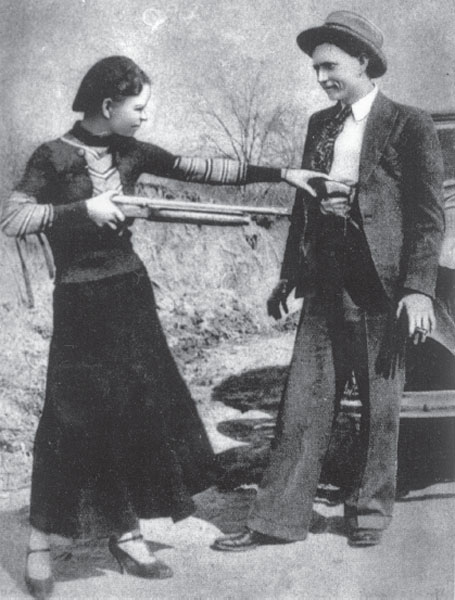
Bonnie and Clyde, clowning. Western History Collections, University of Oklahoma Libraries .
9
BONNIE AND CLYDE
BAD SEED BANDITS
Those two give us all a bad name .
—attributed to Charles Arthur “Pretty Boy” Floyd
From the tales one hears in the Sooner State even to this day, you would think that Bonnie and Clyde were born and raised in Oklahoma. Yet Clyde Chestnut Barrow, who gave himself the middle name “Champion,” and Bonnie Parker were Texans through and through. By the time they met in West Dallas in early 1930, she had been married to Roy Thornton, then residing in the state prison at Huntsville, for about four years. She wore his wedding ring to the day she died.
Clyde rustled his first stolen turkey long before he met Bonnie. Soon after they met, he was arrested for car theft and burglary in Waco, but Bonnie smuggled a pistol into the jail. Clyde escaped but was recaptured in Ohio. One week later, on March 18, 1930, he was on his way to Huntsville.
Clyde was paroled in February 1932 and began a new criminal career with Schulter, Oklahoma native Ray Elzie Hamilton. They pulled off two quick robberies in the Dallas area but killed a jeweler on April 27. During another failed robbery attempt at Kaufman, Texas, Bonnie was captured during a mule-back escape while Barrow and Hamilton ran for the Oklahoma border.
But on the old Texas Road near Stringtown, Barrow, Hamilton and a third man often identified as Ross Dyer were confronted by Sheriff C.G. Maxwell on Friday, August 5, at a dance outside a roadside country store that still stands. Hamilton and Barrow killed Maxwell and wounded Deputy Eugene Moore. By mid-January 1933, they had killed two more law officers and a grocer in Texas.

Bonnie and Clyde, clowning. Western History Collections, University of Oklahoma Libraries .
That March, Clyde’s brother Marvin “Buck” Barrow was released from prison. Nearly two years earlier, in early July 1931, he had married Blanche Caldwell near America, Oklahoma. So now, Bonnie, Clyde, Blanche and Buck journeyed to Joplin, Missouri, where they rented a two-story garage apartment (which still stands) in early April. The neighbors suspected they were bootleggers and called the cops when Clyde accidentally fired a BAR automatic rifle while cleaning it. The Barrows killed two Joplin officers as the gang escaped; in the next two months, bank robberies in Indiana and Minnesota were attributed to them.
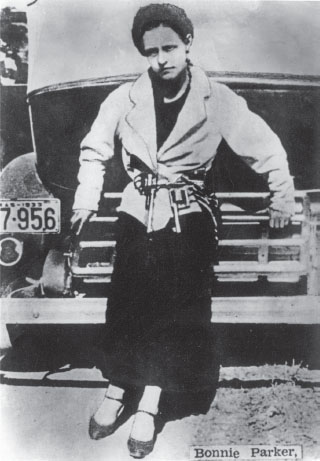
Bonnie Parker, suitably armed. Western History Collections, University of Oklahoma Libraries .
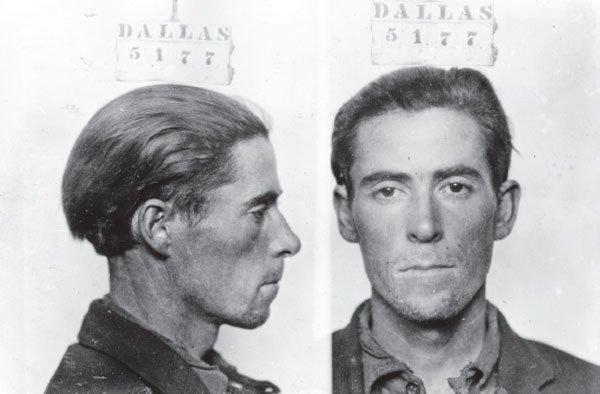
Buck Barrow, clueless. Western History Collections, University of Oklahoma Libraries .
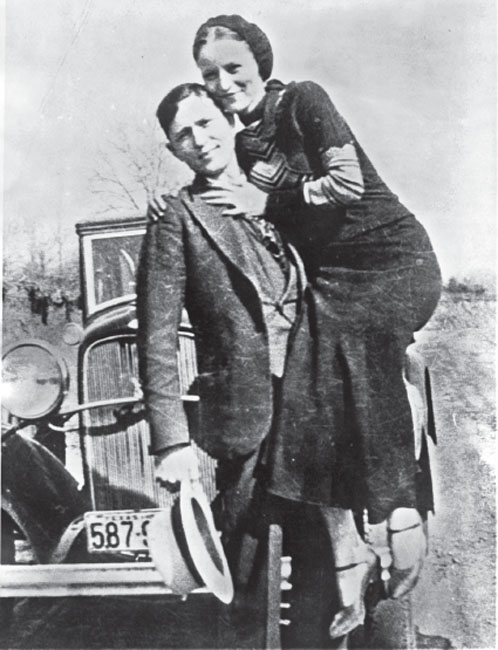
Bonnie and Clyde, mugging. Western History Collections, University of Oklahoma Libraries .
More certainly, on June 11, while speeding toward a bridge near Wellington, Texas, Clyde missed a turn in the road, nearly killing Bonnie in the burning wreck that followed. They kidnapped two Wellington lawmen and then sped toward Erick, Oklahoma, some forty miles to the north, but the Barrows weren’t quiet for long.
Two weeks later, they raided a National Guard Armory at Enid, collecting automatic rifles, over forty pistols and thousands of ammunition rounds for the robberies and gun battles that quickly followed before heading north. The Barrows tried to nurse Bonnie back to health in Fort Smith, Arkansas, but had to leave town when new gang associate W.D. Jones killed the town marshal of nearby Alma. Soon, they tried to do a hit-and-run robbery in Fort Dodge, Iowa; robbed a few gas stations; and even took hostages before heading south.
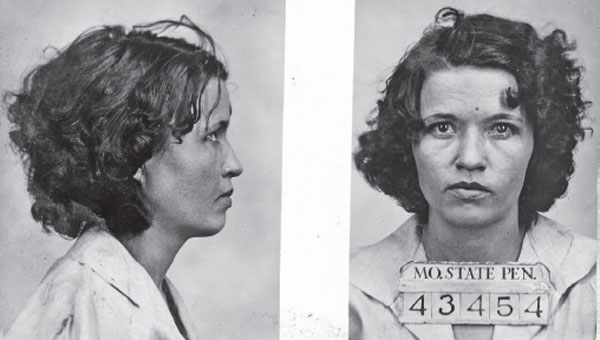
Blanche Barrow, “rid hard and put away wet.” Western History Collections, University of Oklahoma Libraries .
Platte City, Missouri, some 320 miles to the northeast of Enid, was among their first destinations. Now a bustling Kansas City suburb, Platte City was then a quiet town of six hundred. The Red Crown Tourist Court just outside town featured practically new tourist cabins, the best restaurant in the area and even a ballroom. None of this mattered to Clyde Barrow when they arrived on the evening of July 18 since he was simply too tired to go anywhere else. The next day, a suspicious druggist sold Clyde some bandages for Bonnie and then called the police. But Blanche Barrow sealed their fate the next day when she strode into the Red Crown Restaurant sporting fancy red riding pants.
The gang escaped in a gunfight that began in the early hours of July 20, but Blanche was never able to use her left eye again. Worse still, Buck suffered a mortal head wound from which he died five days later. They were captured while Clyde, Bonnie and Jones escaped.
According to one account related decades later, sometime after November 1933, Bonnie and Clyde arrived in Sallisaw, Oklahoma, and tried to contact Charles Arthur “Pretty Boy” Floyd, who refused to help them. Despite this rejection by Oklahoma’s leading bandit, in the five months that followed, the Barrows escaped an ambush and two posses; organized a prison escape near Huntsville, Texas, to spring Clyde’s friend Henry Methvin; killed two prison guards and two police officers; and committed four robberies.
The morning of April 6, 1934, Bonnie, Clyde and Methvin were slumbering just outside Commerce, Oklahoma, twenty-seven miles southwest of Joplin, Missouri. Local constable Cal Campbell and police chief Percy Boyd had received reports that several people were sleeping in a Ford just off a state road leading to the Crab Apple Mine. Sixty-six-year-old Campbell had little experience in law enforcement, but with five mouths to feed and a Depression underway, he welcomed any work he could find.
Clyde spotted the law officers approaching and quickly stepped on the gas but ran the Ford into a ditch instead of onto the highway just as Campbell and Boyd got out of the police car. Campbell managed to draw his pistol, but Clyde was much quicker. While riding with the gang later toward Fort Scott, Kansas, where he was released, Chief Boyd knew that he was lucky to be alive.
No one knows for sure, but there is some evidence that the Barrow gang drove south to Tulsa, where they may have stayed with Willis Newton, whose gang had pulled off the greatest train robbery in American history ten years earlier, near Chicago. While there, Clyde, or someone using his name, mailed a letter from the downtown post office:
Tulsa, Okla .
10 th April
Mr. Henry Ford
Detroit Mich .
Dear Sir:
While I still have got breath in my lungs I will tell you what a dandy car you make. I have drove Fords exclusively when I could get away with one. For sustained speed and freedom from trouble the Ford has got every other car skinned and even if my business hasn’t been strickly [sic] legal it don’t hurt anything to tell you what a fine car you got in the V8—
Yours truly
Clyde Champion Barrow
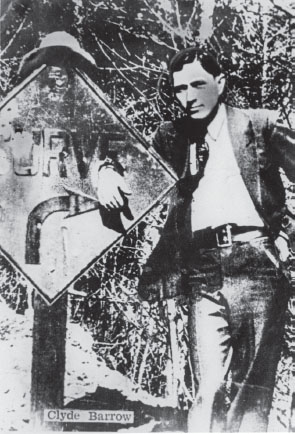
Clyde Barrow, with a dead sign. Western History Collections, University of Oklahoma Libraries .
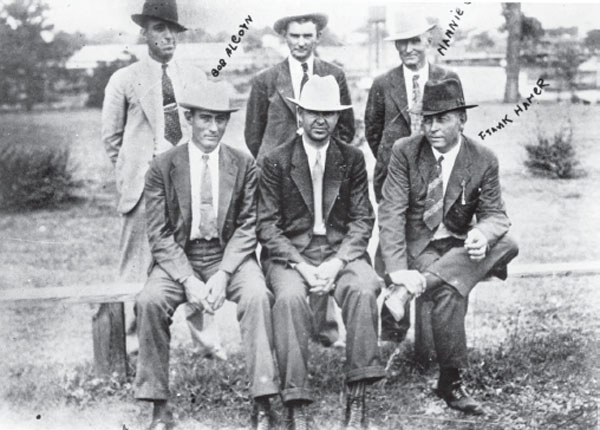
The posse that did in Bonnie and Clyde. Western History Collections, University of Oklahoma Libraries .
In the years since, would-be experts have debated whether this letter or another endorsement signed “John Dillinger” and mailed seventeen days later were fabrications. One such expert remarked that the Barrow letter bears a striking resemblance to Bonnie Parker’s handwriting and might be authentic. More certainly, Bonnie, Clyde and Methvin surfaced near Gibsland, Louisiana, on Monday, May 21, 1934.
Texas bounty hunters and local lawmen knew where to find them, and that was no coincidence. Henry Methvin’s father had been approached by Louisiana law enforcement and convinced to cooperate on the promise that Henry would escape the death penalty. Early that Monday evening, the Barrow crew drove into nearby Shreveport. While Henry was inside a restaurant ordering carryout, Clyde spotted a police car on routine patrol and drove away, leaving Henry to fend for himself.
Later that night, the posse began watching the Methvin family home eight miles south of Gibsland, but Bonnie and Clyde didn’t surface until the morning of Wednesday, May 23. Clyde slowed to look at the old man’s truck jacked up on the side of the road near the Methvin place with one tire missing. Rifles blazed, and gunfire echoed through the trees as the starcrossed lovers slumped into death. Later, retired Texas Ranger Frank Hamer claimed that the posse had given Bonnie and Clyde a chance to surrender.
And maybe it was true.